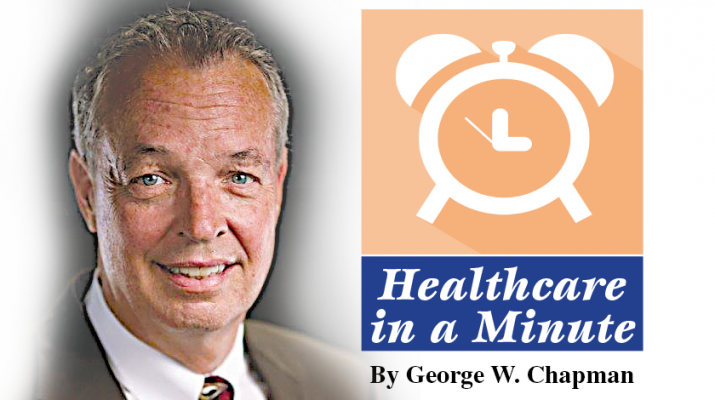By George W. Chapman
 Now 15 years old, as of this writing, the Affordable Care Act is the singular bone of contention between sparring Democrats and Republicans while the government is shut down. The vast majority of Americans, 80 %, favor continuing the tax credits for eligible enrollees who purchase their health insurance on the exchange. If the tax credits expire, the net impact will be as if premiums doubled, causing millions out of the 22 million to drop coverage. Most likely, the relatively young and healthy will drop coverage. Consequently, the risk pool becomes “sicker” which puts more risk on the insurance company, which causes premiums to go up. So ACA eligibles are facing the double whammy of loss of the tax credit and increased premiums. The impact of fewer patients with insurance will have a devastating impact on our providers. If the tax credit expires, forcing millions to drop coverage, it will result in about $32 billion (with a) in lost revenues to hospitals, physicians, pharmacies and ancillary providers. Unable to absorb the losses, providers will seek increased payment from commercial carriers in order to survive, which ultimately drives up premiums for commercial insurance. If all of this seems absurd, to you, you’re not alone. Congress has yet to minimally establish a bipartisan commission to at least look into a national Medicare for all plans. (One last point. Illegal immigrants are not eligible for insurance through the ACA. However, when sick or injured they are going to seek care. The cost of this emergency care is less than 1% of total ACA expenses.)
Now 15 years old, as of this writing, the Affordable Care Act is the singular bone of contention between sparring Democrats and Republicans while the government is shut down. The vast majority of Americans, 80 %, favor continuing the tax credits for eligible enrollees who purchase their health insurance on the exchange. If the tax credits expire, the net impact will be as if premiums doubled, causing millions out of the 22 million to drop coverage. Most likely, the relatively young and healthy will drop coverage. Consequently, the risk pool becomes “sicker” which puts more risk on the insurance company, which causes premiums to go up. So ACA eligibles are facing the double whammy of loss of the tax credit and increased premiums. The impact of fewer patients with insurance will have a devastating impact on our providers. If the tax credit expires, forcing millions to drop coverage, it will result in about $32 billion (with a) in lost revenues to hospitals, physicians, pharmacies and ancillary providers. Unable to absorb the losses, providers will seek increased payment from commercial carriers in order to survive, which ultimately drives up premiums for commercial insurance. If all of this seems absurd, to you, you’re not alone. Congress has yet to minimally establish a bipartisan commission to at least look into a national Medicare for all plans. (One last point. Illegal immigrants are not eligible for insurance through the ACA. However, when sick or injured they are going to seek care. The cost of this emergency care is less than 1% of total ACA expenses.)
The Absurdity of Drug Prices
 Up until the Inflation Reduction Act of 2023, it was literally Illegal for Medicare to negotiate prices on behalf of Medicare and Medicaid recipients, which would save the taxpayer billions. Yes. Negotiating prices was illegal. There was actually a law. The drug lobby is one of our biggest opponents to even a consideration of a national plan. The IRA. finally authorized Medicare to negotiate some drug prices starting with a whopping 10 drugs in 2023 and then skyrocketing to an incredible………(ready?) …. 20 (as in twenty) next year. Instead of taking this as a victory, the greedy drug manufacturers have continually tried to have this repealed as “unconstitutional.” The courts have basically elected to stay out of this. By the way, the number of drugs out there is in the hundreds of thousands. So while the drug lobby tries to repeal the IRA, why hasn’t our Congress, in turn, repealed the IRA and removed the handcuffs from our negotiators and let them negotiate any price they feel like? That would be way too easy. Instead, the administration has threatened manufacturers with tariffs, unless they move manufacturing to the US, which would end up increasing prices like tariffs do. Then there’s TrumpRX. Are you kidding? Then there is the promise to reduce prices by 1,000% How? Why not let Medicare negotiate all drug prices? Why are we tip toeing around this? Pfizer, maybe threatened by the thought of a tariff, has unilaterally negotiated with our administration. I’m sure the drug lobby isn’t thrilled with Pfizer “breaking ranks.” Bottom line is, this is becoming way too complicated and haphazard when billions are at stake.
Up until the Inflation Reduction Act of 2023, it was literally Illegal for Medicare to negotiate prices on behalf of Medicare and Medicaid recipients, which would save the taxpayer billions. Yes. Negotiating prices was illegal. There was actually a law. The drug lobby is one of our biggest opponents to even a consideration of a national plan. The IRA. finally authorized Medicare to negotiate some drug prices starting with a whopping 10 drugs in 2023 and then skyrocketing to an incredible………(ready?) …. 20 (as in twenty) next year. Instead of taking this as a victory, the greedy drug manufacturers have continually tried to have this repealed as “unconstitutional.” The courts have basically elected to stay out of this. By the way, the number of drugs out there is in the hundreds of thousands. So while the drug lobby tries to repeal the IRA, why hasn’t our Congress, in turn, repealed the IRA and removed the handcuffs from our negotiators and let them negotiate any price they feel like? That would be way too easy. Instead, the administration has threatened manufacturers with tariffs, unless they move manufacturing to the US, which would end up increasing prices like tariffs do. Then there’s TrumpRX. Are you kidding? Then there is the promise to reduce prices by 1,000% How? Why not let Medicare negotiate all drug prices? Why are we tip toeing around this? Pfizer, maybe threatened by the thought of a tariff, has unilaterally negotiated with our administration. I’m sure the drug lobby isn’t thrilled with Pfizer “breaking ranks.” Bottom line is, this is becoming way too complicated and haphazard when billions are at stake.
Primary Care Doc Shortage
 It is estimated that by 2037, or in about 11 years, we will be short 87,000 primary care physicians. Our healthcare systems, medical schools and government need to increase primary care incentives and resources such as free or discounted tuition, tax incentives, tailored medical school curriculums and relax visa impediments. Hospital systems now employ 50% of primary care physicians and 77% of all physicians so they have control over salaries which, of course, is an issue as most specialties earn more than primary care. The administration’s decision to increase the HB-1 visa fee from $5,000 to $100,000 does not help. The sponsoring organization, say a hospital, must pay the $100,000 fee to employ a foreign grad. If it wasn’t for foreign grads, our current shortage would be worse. Rural health systems have relied on foreign grads to maintain staffing. (And foreign grads do not deprive US grads of jobs.) After six years on HB-1 status the physician can apply for permanent residence.
It is estimated that by 2037, or in about 11 years, we will be short 87,000 primary care physicians. Our healthcare systems, medical schools and government need to increase primary care incentives and resources such as free or discounted tuition, tax incentives, tailored medical school curriculums and relax visa impediments. Hospital systems now employ 50% of primary care physicians and 77% of all physicians so they have control over salaries which, of course, is an issue as most specialties earn more than primary care. The administration’s decision to increase the HB-1 visa fee from $5,000 to $100,000 does not help. The sponsoring organization, say a hospital, must pay the $100,000 fee to employ a foreign grad. If it wasn’t for foreign grads, our current shortage would be worse. Rural health systems have relied on foreign grads to maintain staffing. (And foreign grads do not deprive US grads of jobs.) After six years on HB-1 status the physician can apply for permanent residence.
Mental Health Crisis
 Our hodge podge, ineffective and expensive approach to healthcare impacts mental health the worst. It has always been the stepchild of healthcare. The Committee to Protect Public Mental Health has expressed its concern to the current secretary of health that his actions, so far, have increased the stigma, instilled fear and limited access to mental health and addiction care. The committee supports decisions based on science and evidence if things are going to improve. Mental health conditions are prevalent throughout society. An average of 1 in 4 of us experiences a mental health condition every year. One in 5 of us has a current ongoing condition. One in 20 of us has a condition that significantly interferes with daily living. One in 5 of us has an anxiety disorder. Eight percent of us suffer from depression. Four percent of us suffer from PTSD. Three percent of us are bipolar. Ninety percent of us believe there is a mental health crisis.
Our hodge podge, ineffective and expensive approach to healthcare impacts mental health the worst. It has always been the stepchild of healthcare. The Committee to Protect Public Mental Health has expressed its concern to the current secretary of health that his actions, so far, have increased the stigma, instilled fear and limited access to mental health and addiction care. The committee supports decisions based on science and evidence if things are going to improve. Mental health conditions are prevalent throughout society. An average of 1 in 4 of us experiences a mental health condition every year. One in 5 of us has a current ongoing condition. One in 20 of us has a condition that significantly interferes with daily living. One in 5 of us has an anxiety disorder. Eight percent of us suffer from depression. Four percent of us suffer from PTSD. Three percent of us are bipolar. Ninety percent of us believe there is a mental health crisis.
Good News on the Autism Research Front
 Whether or not it is caused by Tylenol, vaccines or a full moon, there is some positive news amidst the controversy surrounding the causes of the condition. Despite significant cuts in federal grants for research under RFK Jr., there is some positive news. Cornell University has received a $5 million grant from the NIH’s Autism Data Science Initiative. Overall, the NIH has earmarked $50 million for autism. This is a welcome change in course for the NIH.
Whether or not it is caused by Tylenol, vaccines or a full moon, there is some positive news amidst the controversy surrounding the causes of the condition. Despite significant cuts in federal grants for research under RFK Jr., there is some positive news. Cornell University has received a $5 million grant from the NIH’s Autism Data Science Initiative. Overall, the NIH has earmarked $50 million for autism. This is a welcome change in course for the NIH.
Telehealth
 Congress left Medicare coverage for this to expire Sept. 30. (For what it’s worth, telehealth was made a “permanent” benefit in 2023.) Consequently, providers are canceling calls with their senior patients or warning them they will have to pay for the call out of pocket. In the first quarter of the year, 15% of Medicare recipients used telehealth with their provider. That number was steadily increasing. Discontinuing telehealth disproportionality impacts seniors, the disabled and people residing in remote areas. The fear among telehealth proponents is that commercial insurers, typically emulating Medicare, will follow suit. I’m not sure whether Congress intentionally let this lapse or was an oversight amidst the seemingly endless chaos in Congress.
Congress left Medicare coverage for this to expire Sept. 30. (For what it’s worth, telehealth was made a “permanent” benefit in 2023.) Consequently, providers are canceling calls with their senior patients or warning them they will have to pay for the call out of pocket. In the first quarter of the year, 15% of Medicare recipients used telehealth with their provider. That number was steadily increasing. Discontinuing telehealth disproportionality impacts seniors, the disabled and people residing in remote areas. The fear among telehealth proponents is that commercial insurers, typically emulating Medicare, will follow suit. I’m not sure whether Congress intentionally let this lapse or was an oversight amidst the seemingly endless chaos in Congress.
 George W. Chapman is a retired healthcare business consultant who worked exclusively with physicians, hospitals and healthcare organizations. He used to operate GW Chapman Consulting based in Syracuse.
George W. Chapman is a retired healthcare business consultant who worked exclusively with physicians, hospitals and healthcare organizations. He used to operate GW Chapman Consulting based in Syracuse.

